#horde prime backstory
Explore tagged Tumblr posts
Link
Chapters: 1/1 Fandom: She-Ra and the Princesses of Power (2018) Rating: Teen And Up Audiences Warnings: No Archive Warnings Apply Characters: Skeletor (He-Man), Keldor (He-Man), Horde Prime (She-Ra), Hordak (She-Ra), Horde Prime Clones (She-Ra), Sorceress of Castle Grayskull | Zoar the Falcon, He-Man | Adam, Adora (She-Ra), Evil-Lyn (He-Man) Series: Part 2 of She-Ra Stories - Postbellum Summary:
The backstory of Skeletor, Horde Prime, and Hordak before the events of She-Ra 2018 and He-Man: Fight for Eternia. It is recommended that you read He-Man: Fight for Eternia, as it was written with the expectation that you have that context.
#she ra#spop#he man#motu#hmffe#skeletor#skeletor backstory#horde prime#hordak#prince adam#horde prime backstory#hordak backstory#eternia
1 note
·
View note
Text
Ok so She-Ra pulled such a great hat trick with Hordak's characterization, and I LOVE it
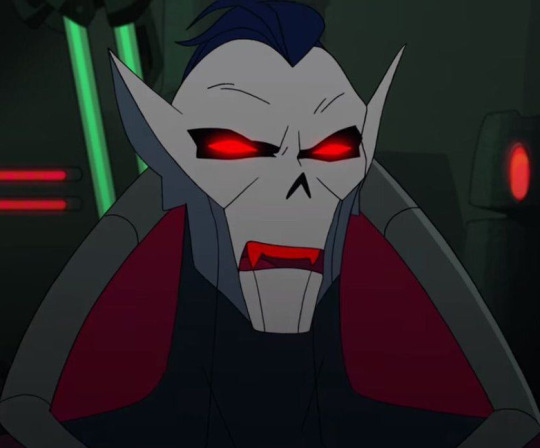
One of my favorite things about 2018 She-Ra is Hordak's story and development (and Entrapdak cough but that's not the point of this particular post), and the cleverest thing is that so much of it is actually being set up and told to us in seasons 1 and 2 before we even realize that that's what's happening.
When we first see Hordak in the show, he's giving "generic evil overlord" vibes. Garden-variety baddie. Maybe a little more reasonable than some and clearly capable of long-term thinking, but that just serves to make him intimidating. Everything about him--the way he runs his empire, his armor, his color scheme, his minion, his Villainous Eye Makeup(TM), even his name--are all projecting to the audience "yup, Acme Bad Guy here. Move right along."

But then, backstory. And everything snaps into focus. Not only is it one of the first big oh SHIT moments of the show, where we suddenly zoom out and realize that there is SO much more going on than we realized--it's also the start of the audience seeing Hordak as a character rather than an archetype. Suddenly we realize that he's not conquering Etheria because he wants power, or hates happiness and sparkles, or whatever--he's doing it out of a desperate attempt to prove his worth to his brother/creator/god. This moment where Hordak lets Entrapta in is also the moment the show lets us in on what makes our favorite spacebat tick.
On top of that, we've also seen him bonding with Entrapta and opening up to this person that he respects and trusts...probably the only person he's ever respected or trusted apart from Prime. And she's Etherian--someone of a lower species, someone he's supposed to subjugate, someone who he has been raised and trained and programmed and mind-controlled into believing is below him in every way.
But instead she's brilliant and creative and mesmerizing. She's not afraid of him, and she's fascinated with his work. For the first time since being abandoned by Prime, Hordak finally has someone that he can talk to, who is on his level and both understands and cares about the science! (because he is a giant nerd). She's kind to him, a mere defect. And it just sends his whole worldview into a spin, and that's all before--
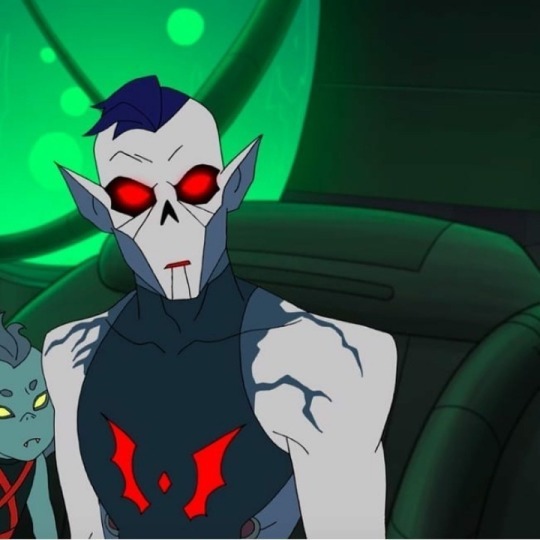
Bam, mans is a goner. Entrapta's "Imperfections are beautiful" comment punches right through all the toxic bs that Hordak has been steeped in his entire life. You can see on his face here--I think it's the moment Hordak fell in love with Entrapta, but this is also the face of a spacebat reevaluating his entire worldview. If Entrapta, who is amazing, believes something different from Prime...what does that mean? If Entrapta, who is brilliant, believes that he is worth something, and that she herself is a failure...
Well. We know what happens after that, and how Hordak begins to doubt, and eventually fights back against Prime (and remembers his love for Entrapta after TWO mind wipes help my heart ack). But we also get to see what life in the Galactic Horde looks like: the only life Hordak ever knew before coming to Etheria.

It's not nice.

It's really not nice.
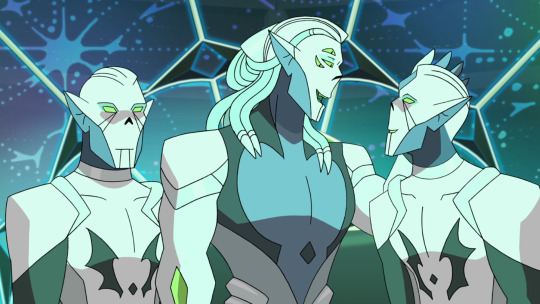
Prime operates in a very specific way, and we learn a lot about it in season 5. Prime expects complete obedience, devotion and worship from his clones. He allows no individuality from his subjects, not even a name. Failure or deviations are punished, mind-wiped, or destroyed. We even learn from Wrong Hordak that facial expressions are considered a privilege reserved for Prime (apart from, presumably, expressions of rapture caused by being around Prime).
And once we learn all of this, suddenly thinking about season 1 Hordak becomes very interesting indeed. The time we spend with the Galactic Horde and Prime throws absolutely everything that we know about Hordak into a whole new context. Now all those traits that made him a generic villain are actually hugely effective characterization! And what that characterization is telling us is that Hordak had already moved much farther away from Prime than we (or, probably, he) had realized, even long before he met Entrapta.
Horde Prime does not allow his underlings to have names, personalities, or any differences of appearance. Not only does Hordak allow this among his own troops, he chose a name for himself as well! Season 5 tells us that his very name is an act of blasphemy against his god. And yet Hordak took one for himself, and that name is part of the core identity he is able to hold on to when rebelling against Prime.
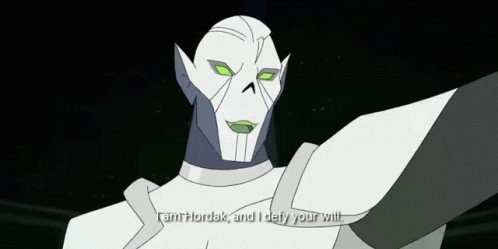
Horde Prime cast Hordak out when he showed signs of physical imperfections. Hordak not only keeps Imp (who is by all appearances a failed clone or similar experiment) around, he treats Imp more gently than we see him treat anybody or anything before Entrapta. Imp is not simply "generic evil guy's minion," he is proof of Hordak's capacity for compassion, and evidence that Hordak cannot bring himself to cast aside "defects" as easily as Prime. Considering where Hordak came from, Imp's existence is a huge, flashing neon sign telling the audience this guy here is better than the hell that molded him, and we don't even realize it until 4 seasons after it's been shown to us!
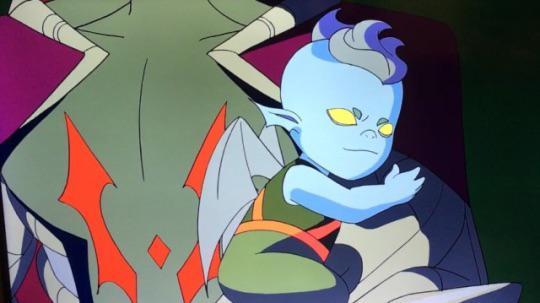
Very cool, ND.
There's more, though. Hordak's red and black color scheme? His dark eye makeup and lipstick? Very Evil Overlord chic. But nope! Actually these are actually expressions of individuality on a level that Hordak knows would be abhorrent to Prime!
Reading between the lines, I see this as Hordak desperately trying to reconcile two diametrically opposed beliefs in his head: (1) devotion to Prime, whose approval he desperately craves, and (2) maintaining some degree of unique personhood, of Hordak, from which to draw strength. Because a failed, defective clone cannot survive on a hostile world, cut off from the hivemind and from Prime's light. A failed clone cannot create an empire to offer Prime as tribute, nor build a spacetime portal from scraps and memory to call Prime back. A failed clone cannot create cybernetic armor to keep his hurting, weakened body alive; to force himself to keep going no matter what, to fight through the pain and the doubt by sheer force of will.
But maybe Hordak can.
And so there it is. Hordak had plenty of time to gain and explore his individuality while separated from Prime, but I think the reason he did it so effectively (while still deluding himself that Prime would forgive him for these little sins, if only Hordak could prove his value) is because he had to.
Wrong Hordak gained his individuality surrounded by kind, quirky people who took care of him; Hordak was ripped from the hivemind by Prime himself and had to fight for his survival against all odds. And that produced a dangerous and damaging foe for Etheria. But it also produced the one clone with the strength of will to defy Prime himself.

This is long and rambling, but ultimately my point is that 1) I love Hordak, and 2) I love love love love that the show was so clever about his characterization. We learn so much about him and how much progress he's already made in breaking from his psycho abusive cult upbringing, and we don't even recognize it until the show wants us to. Hordak had come so far, all on his own, before he met Entrapta. She just helped push him over the edge and finally realize (at least consciously) that Prime's worldview might not be the correct one.
Idk, I just don't know if I've ever seen all the trappings of Basic 80's Villain(TM) so successfully subverted, where looking back 4 seasons later is actually a smack in the face with the "effective character building" stick. Amazing.
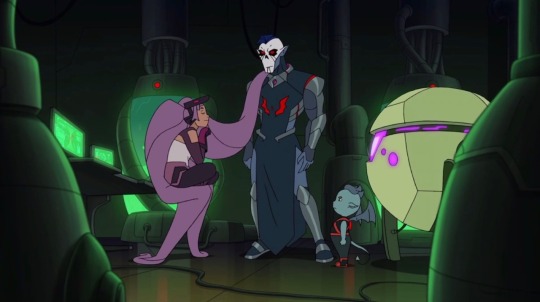
#spop#she ra#she ra and the princesses of power#hordak#entrapdak#entrapta#horde prime#Spacebat#Deep character analysis#Gotta love clever writing#Seriously I could go on about this show for ages#I just love the characterization for everyone but especially Hordak#Best spacebat#I mean I love Wrong Hordak too but you know
2K notes
·
View notes
Text
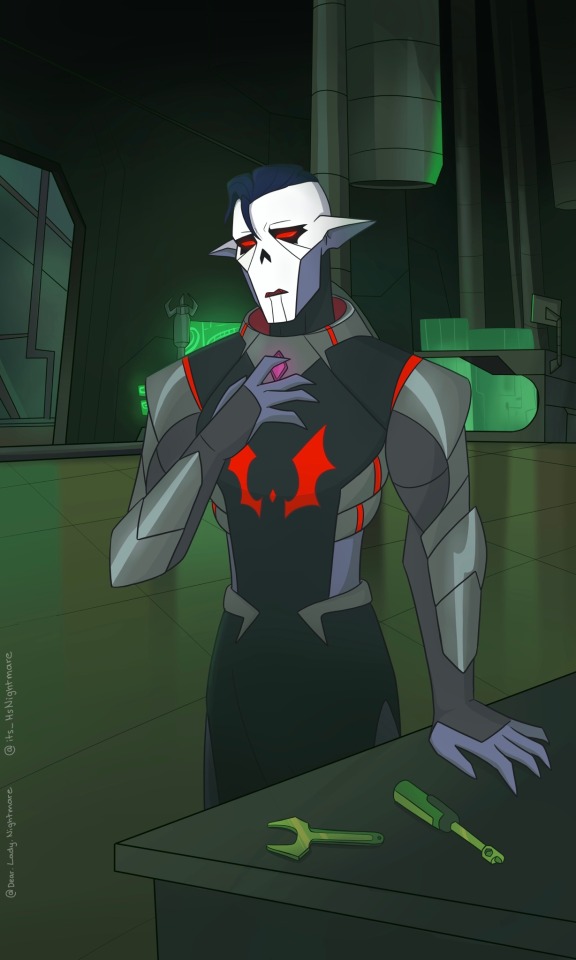
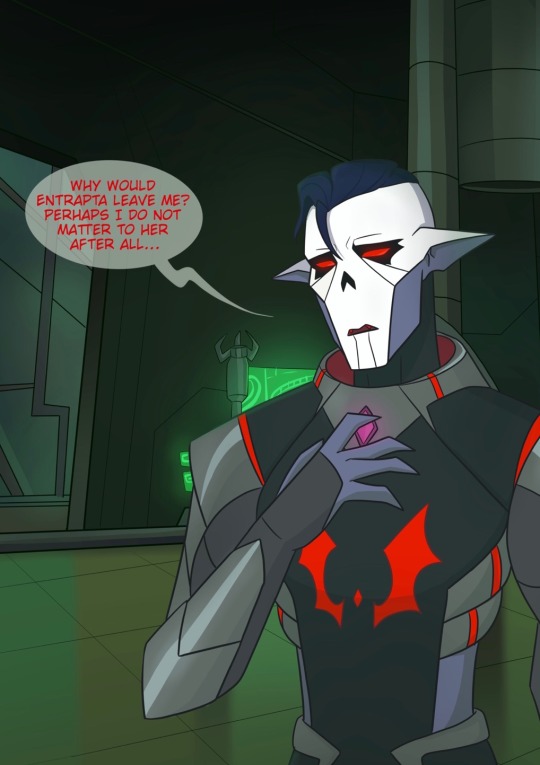
Hello everyone💜
As you remember from two days ago, I wanted to talk about Hordak and the time when Entrapta and he have been separated.
Well and here it comes.. a few heartbreaking thoughts of mine.
At the beginning of the series, I didn't think much of Hordak. He was simply a villain who did terrible things for whatever reason.
But the way I usually feel about such characters is that I develop an incredible amount of sympathy as soon as I understand the character's motivations.
And Hordak's motivation comes from an incredibly sad backstory filled with a false conception of a God, life in a cult, rejection, humiliation, self-doubt, and the conviction that you have to prove yourself valuable to someone in order to be loved.
And all this makes Hordak not a monster, but something human. (Of course, this in no way justifies his actions, but a sense can be made of it.)
A friend and I call this characteristic of a villain: Opfer der Umstände (victim of circumstances).
And now to the actual topic. Entrapta was gone and Hordak believed Catra when she said that Entrapta had betrayed him.
It broke my heart. I thought: Hordak, you idiot!! Why would you believe that Cat more than Entrapta. You must have felt something was wrong. I mean we are talking about Entrapta, the woman who cherished you, who helped you, who loves you for who you are, who sees no defect, but a being worthy of love.
And THAT was the reason why Hordak believed Catra. He was so filled with self-hatred, fueled by a god - his god - the center of his universe- who denied Hordak any value by rejecting him.
That someone could love him, like Entrapta seemed to do, was simply impossible. Not compatible with the reality of his life. It was too good to be true. Blinded by his desire to be loved, this princess betrayed him.
He felt stupid, abandoned, heartbroken. But in his eyes it was the only possible truth and he deserved to suffer because of this sin. The sin of believing he was worthy before Horde Prime confirmed it.
And when he found out that Catra lied, his world collapsed. He was truly loved by this women and because of his insecurities she probably died.
So I hope I’m done breaking your heart and mine as wellxD thanks for reading!💜💜
#hordak#entrapta#she ra entrapta#she ra netflix#entrapdak#she ra 2018#she ra fanart#fanart#spop#she ra and the princess of power fanart#deep thinking#deeptalk
273 notes
·
View notes
Text
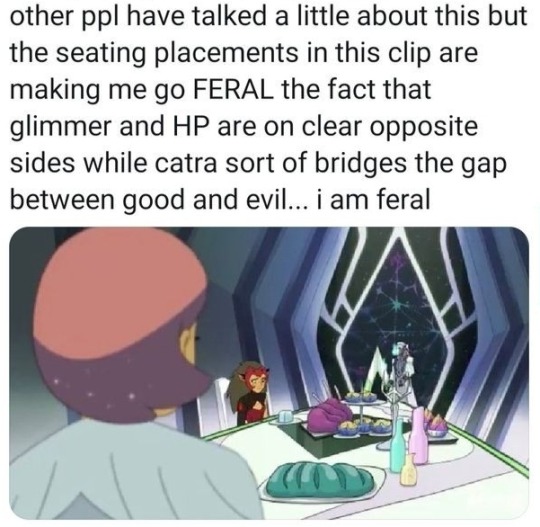
i've seen this post a couple times. i doubt the writers did this intentionally but in the off-chance that they did.. they didn't really get the point across.
catra has done many of the same things that horde prime has done. let's see...
conquered and destroyed kingdoms, killing or injuring innocent civilians in the process
brainwashed others to control and manipulate them for personal gain
kidnapped and imprisoned people
manipulated and abused a “family member” (and others)
unwanted touch and creepy behaviour towards their victims
tried to commit mass genocide
attempted to murder she-ra
catra is in no way the “bridge between good and evil”. she is evil; she's just horde prime with a tragic backstory. the tragic backstory is the only reason people think that catra is a good person. she is no better than horde prime.
83 notes
·
View notes
Text
I think it's strange, to be honest. In theory, Hordak is worse than Catra for being a dictator and all. But despite that, Hordak never treats Entrapta like shit and his backstory makes sense. It doesn't excuse his actions but it makes sense why Hordak wants to conquer Etheria - he wants to be accepted by Horde Prime. Catra is also a victim of abuse and that's valid, but she abuses Adora and treats everyone else like shit, and honestly I think she becomes worse than Hordak by activating the portal, not to mention she basically blackmails Hordak in season 4 by taking advantage of his disability (which does not make her look like a badass, but genuinely cruel, especially as he's not even her abuser*). She shames him for missing Entrapta and manipulates Hordak by making him believe Entrapta betrayed him.
*The post linked is old and ND's name is outdated, just so you know.
But most importantly, Catra doesn't conquer the world to be accepted, she just wants power. Worse, all she wants is for Adora to lose. That's her entire character.
Again, Hordak actually listens to Entrapta, he values her opinion and her hard work. He never lays a finger on her. Catra, on the other hand... It's wild because the fandom wants us to see the opposite, that Hordak is the abusive dick who mistreats his love interest while Catra is the only one who truly loves Adora. If you ship Entrapdak, you're accused of romanticizing abuse, which could not be more hypocritical.
61 notes
·
View notes
Note
Hello fellow Double Trouble fan!
I’ve been sitting on the idea of a fanfic where Double Trouble returns to their home and reflects on their life but I keep putting it off.
What do you think Double Trouble’s motives were when they became Catra’s spy? Despite the danger they were putting themselves in by working for the Horde (Hordak could have had them killed or imprisoned if he wanted to I mean), they didn’t seem to have a problem with it.
I know they did it for money and asked for payment for their work (and information that one time) but they could have gotten an acting job from anywhere. It didn’t have to be specifically the Horde.
I can’t help but think there’s something else driving Double Trouble. They’re simultaneously allies to both sides but friends to no one and their ‘for a price of course’ line with Catra after saving her could have also served as a way to keep her at arms length from them.
Maybe I’m looking too deep there but if that’s the case and DT really doesn’t want anyone getting too close to them or for themselves to get too attached to anyone else, it might makes sense that they don’t fully align with the Horde or the Princesses.
Sorry that I’m rambling, I’m just curious what you think! 😅
Squeeeeee I'm so excited about this ask!
My answer is long, so I'm putting it under a cut.
Since the backstory you give them will impact this, let's start with what we know in canon or can infer.
DT is morally-gray and neutral. They don't care who they work for, so long as they get paid and cause some drama and chaos along the way. Survival is their main goal. They want to be on the winning side, but they also want to have fun. This is why the didn't side with Prime--they were too bored posing as a clone. I think this may have impacted why they offered their business to Catra first. She seemed more fun, more chaotic, more willing to let them toy with people how they clearly enjoy doing. Their motives for switching sides were a lot more survival based.
DT brings up survival a few times. "The best way to survive is always to join the winning side." If we assume that DT lives in the Crimson Waste, or even somewhere else that has felt the effects of the war pretty strongly, we can see why that would be one of their main deciding factors. DT is a self-preservationalist, ensuring they come out on top, no matter who they have to back-stab and manipulate along the way. They look out for number one likely because they're the ONLY one looking out for themselves. I don't think it's reading too deep to infer that DT avoids developing relationships and connections with others, and I think that's a survival tactic for them--can't get betrayed if there's no one there to betray you. One of the rules in the Crimson Waste is "trust no one," and I'll bet DT is just as subject to that as anyone living there (or spending a lot of time there--due to DT being a mercenary, spy, and likely having been involved in criminal activity of some kind, it's safe to assume that they've spent a lot of time in the Crimson Waste, regardless of whether they were born and raised there, moved there, or don't reside there at all but find lots of work there).
Given that DT has the moral backbone of a chocolate eclair, I think they did get more enjoyment out of being a Horde spy than they would have if they'd started with the Rebellion. They loved watching the princesses mope and lose morale, and they loved teasing Glimmer. Although DT is a neutral character who didn't align with the goals of the Horde, they definitely find amusement in other people having a bad time, especially if they helped cause it. As @.sheblah put it, DT can be a little evil, as a treat, but it's not their main reason for doing things. However, I do think it's something that would have swayed them to team up with Catra rather than the Rebellion.
This one is more speculation, but I personally think DT saw Catra as a bit of a kindred spirit. I think they were able to pinpoint her habit of pushing others away because they do it, too--the only difference being that Catra isn't aware/is in denial about it, and DT strategically distances themselves due to inherent distrust of others/caring about themselves above all else. I do think DT liked Catra, as they certainly seem to get along with her and like making her smile, but I don't think that would stop them from betraying someone. If anything, I feel like it may have fueled it. I see DT as someone who self-sabotages relationships to remain solitary. "Oh no, we're becoming actual friends. Better stab her in the back and tear down everything she cares about so she'll hate me, and then there's no possible way I could care about her. I have a reputation to uphold!"--something like that. You can add an extra layer if you interpret then as having a crush on Catra by seeing their interactions with her, especially "kitten" and the infamous chin-grab, as flirty, but this is more up to speculation, and you can take it or leave it.
Now, onto more fanfic backstory goodness.
Since DT doesn't have a backstory in canon, you can make up ANYTHING. What kind of family they came from (if any at all--many go the orphan route), where they grew up, what may have happened in their past to shape who they are today. I, myself, have multiple different backstories for them.
It's possible DT joined the Horde because they wanted to spite someone. It may be because they didn't remember or care how the Horde had hurt them or anyone they knew in the past (if at all). It may be because they'd had a hard life and needed a lucky break. Maybe they were desperate for money, either for themselves or for someone else that they were sending it back to, such as a family member. Maybe they were angry at the hand they'd been dealt in the world and just wanted to screw things up for everyone else for once. Maybe it was because they had a feeling there was something special about Catra that drew them to her. Maybe they felt they could help her in their own little way. Maybe they just loved the thrill of it all, the drama. Maybe their goal was to take down the Horde from the inside the whole time. Maybe Catra just looked more like someone who'd hire them than the Rebellion. Maybe they truly didn't care and just flipped a coin.
It's all up to you, and giving them a motive shaped by their backstory could help you decide if they feel any guilt or have any regrets about their role in the war.
I hope this helped! I'm always happy to talk about DT, so don't be shy!
And scene!
8 notes
·
View notes
Text
Horde Prime is just such a lame final villian, He has no ersonality beyond just evil cult leaderrr like you have SO MUCH potential there! There is SO MUCH you can do with having a literal CULT LEADER as your main antagionist, I say this as someone who's written a story with a cult leader before. Y'know a show that does villians right? RICK AND MORTY BABY!
Honestly I don't get the hype around Rick Prime, he's not the greatest villian, he's fine, he's passable, but he doesn't have much personality, kinda seems like wasted potential. Especially considering that he didn't personally know Rick c137, and only brutally killed his wife and child because he bruised his ego. And I struggle to say three words about him, I mean uhhhh he's evil, sadistic, and uhm....has a big ego. I mean he's a fun to watch, and is admittadly very memorable. Also, it's honestly refreshing to have a villian that doesn't have some tragic backstory, honestly though, I feel like Evil Morty is a MUCH more interesting villian. He's smart, manipulative, cunning, arrogant, and is shown to have a sense of humor (Example Rick c137 saying "Are you better than me?!" And Evil Morty replying "Jesus Chirst, I hope so!) and is very good at making plans. Needing only one day to completely control Evil Rick, he also has a belivable backstory, his Rick is implied to be physically abusive, since he has a tendency to flinch, we actually see him flinch and shield himself in his backstory when Evil Rick yells at him, but both of these villians are WAY better than Horde Prime because THEY HAVE PERSONALITIES.
While Rick Prime doesn't have a ton of personality, they make up for that by having him be fun to watch, Horde Prime is just boring, he has no interesting dialogue, as of writing this I can't remember a SINGLE line from him, just the god-awful deleted victim blaming line "You always wanted more, all she ever wanted was you"
Meanwhile the lines I remember from Rick Prime off the top of my head "You think it's cool being the smartest man on earth, but once we give you this technology you become the smartest thing in every concieveable universe, the infinite Rick, a god." "It's a non-stop where all the guests are the only people we like" "Or me! Again it might be me! But like a saw thing! I'm veryyy sneaky." "Look it's the wife guy! Dead wife Rick! I'll tell you this guy does not know when to quit (...) You brought two Mortys with you? What are they, your cheering section?" "What're gonna do? 'Aw Jeez' me to death? Oh you don't want those scematics buddy, those are for grownups. (...) Listen, Rick to Rick, he's got the weapon plans, buddy, nip this in the bud! He's 14! What's gonna happen the next time he gets mad at Grandpa?" And my all time favorite lines from him that he says while literally getting brutally beaten to death by the guy who's wife and child he brutally murdered "Haha! Let's do this then! You're welcome by the way! I MADE you! I showed you infinity! And what did you do with it!? Hang out with MY grandson?! Raise echos of MY daughter?! What's your LIFE without me!? Admit it! You would've been me! I just walked into your garage before you walked into mine! But eventually you did! YOU LIVED IN MY HOUSE!" He made it abundatly clear that he regrets NOTHING! Not. One. Single. Thing. Meanwhile I literally cannot remember Horde Prime's last words.
How do you screw up THAT badly with a final villian? Rick Prime isn't the greatest villian, but at least he's fun and memorable. What's memorable about Horde Prime besides his character design? That's right! Nothing! Evil Morty is an amazing villian with an interesting backstory that makes sense, being one Morty who finally snapped after years of emotional and implied physical abuse. Meanwhile Horde Prime is just uhhhh evil and uhmmm that's it. He's evil, deal with it. HE'S A GOOD FINAL VILLIAN!
Sorry I kinda blabbered on about Rick and Morty for too long, it's just AMAZING how many things it does better than spop, it's not the greatest tv show ever, but I like it nonetheless, and when it does good, it does GOOD! It just has a bad reputation because of those godawful episodes in seasons 4-6, I won't specify, but if you know, YOU KNOW! Ok, I'll stop talking now, I hope you enjoyed this comparison!
#anti spop#spop criticism#spop critical#spop discourse#spop salt#spop crit#Rick and Morty#Anti Horde Prime
22 notes
·
View notes
Text
why do cult leaders in media always gotta be sympathetic and have super tragic backstories and good intents behind the cult
this isn't to say i don't love characters like Fiddleford & Viktor (though idk if Viktor is quite the same yet as im only on Arcane season 2 act 2) where they have good intentions but end up brainwashing people
but i want a cult leader that is money hungry and power hungry and gives victims stupid rules so they'll always be tearing themselves apart trying to appease the one that they think will save them
not because i like irredeemable villains but because i want to be seen
my best examples that i know of are King of Ooo and Horde Prime
8 notes
·
View notes
Text
The Rueful Tale of Philip Wittebane
Why Emperor Belos is the Greatest Villain in Modern Media

I’ve been sitting on this one for a long time. Full disclosure, I never shut up. My username is no joke. So be prepared for me to go on and on. But I unironically think this character is a masterpiece, that he leaves his contemporaries like Bill Cipher and Horde Prime trailing behind, and I’ve been itching to talk about why. Let’s dive in.
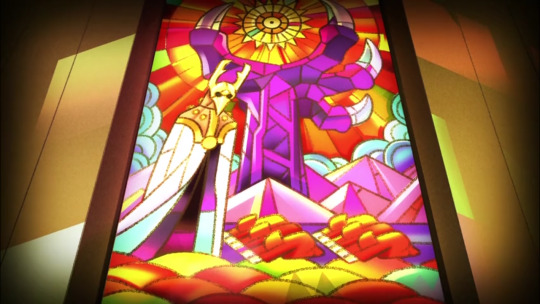
Chapter 1 - The Myth.
Belos is first introduced as an idea, an overarching threat that looms over the heroes and their world. He starts out as an enigma, a mystery, and gradually, the layers are peeled back to reveal the monster underneath. In Season 1, the antagonistic force that The Owl House deals with is less Belos himself, and more the world he creates. Because what he represents is in total opposition to the morals of The Owl House crew and to the very message of this show: Acceptance. This is a through-line that remains consistent about the character to the very end, but we see hints of it from the first episode. Little things like how the prison is called the “Conformitorium.” One of the first things that makes Belos a terrific villain is that his very nature is in conflict with that of the protagonists. This is a battle of ideals, and we as an audience are persuaded to see things the way the heroes do, and understand why Belos is wrong.
Yet he remains in the shadows throughout the first season, creating slow build-up and a good reveal to his character. Instead, we see the impact that his reign has had on the Boiling Isles, and initially the Coven System is presented as an ideological debate. The story toys with the idea that it might even be a good thing, that Eda is ignorant for her resistance. For a very long time, we know precious little about Belos apart from his image. Even when we meet him, he is posturing and misrepresenting himself as a prophet for The Titan, and he does it all from behind a mask. Figuratively and literally, he conceals his true nature. We don’t learn the real truth about Belos until Season 2. We don’t even learn his real name. He’s built a mythology for himself in The Boiling Isles, but while other villains might embrace these lies and choose to believe them, Belos is a little different. By no means is he in touch with who he really is or why he feels the way he does…but unlike most villains who fit into this trope, Belos disdains his image as much as he does anything else in the Isles. He prefers his real name.
As the story of The Owl House develops and the characters are fleshed out, as we learn more about this world, Emperor Belos’ disguise is slowly stripped away, as are the lies and propaganda his regime has established. Supposedly, The Isles were in complete chaos until Belos turned up, yet when Luz and Lillith travel back in time to the “savage ages” we see a world that is happy and free. The clues about Belos are pre-set well before the actual moments of revelation. Notably, a book about Grimwalkers can be seen at the beginning of Eclipse Lake. During the scene where we see him unmasked for the first time, as he shares dialogue with none other than Hunter. That’s not a coincidence, anymore than his nostalgia for the human realm as we learn that he’s been there before. The truth is hiding in plain sight, and many viewers picked up on the hints at the time. That Belos was not who he said he was, that he was likely human. Fans guessed that there was something off about Hunter, and Belos was behind it.
It is here that Belos deviates from expected tropes.
When a villain is initially presented as a monster, but the following installment provides them with backstory and context for why they are the person they’ve become…normally, this is the part where said villain gains sympathetic qualities. At least, the memorable villains do. One would assume that in Season 2, when we learn where Belos comes from and why he turned out this way…that we could see things from his point of view. That we could see another side to him. Even if he’s still in the wrong, there must be some explanation for his actions, surely? Something that would earn him compassion from the audience. But that’s not what happens. The scene in Eclipse Lake shows us his face, making it easier to personify him. It shows him being softer with Hunter, gentle with him…but there is still the uncomfortable air of manipulation. Which symbolizes the journey that the audience will take with Belos. Upon learning his origins, we understand him even better…and as a result, we hate him all the more. Any fragment of fondness is snuffed out when we realize that his more likable qualities are not and were never real. This is why we learn about Philip before we learn who he really is.
Now typically, the greatest villains are the ones who, in another story, could have been heroes. The villains who have justifiable motives, the villains who feel conflicted about their villainous actions. In essence, the most memorable antagonists are the ones that the audience cannot help but root for, the ones they hope to see redeemed. Prince Zuko from ATLA is an iconic example, Catra from SPOP is another. We as an audience have sympathy for villains who are in pain, who could, under the right circumstances, be brought back into the light. That is fundamentally averse to everything about Belos, not just as an antagonist but as a person. The man is irredeemable, and there are several key moments in the story that prove it. A villain must first wish to be redeemed in order for it to happen, they have to make that decision themselves, and Belos will never do it. Yet he exists as proof that villains do not have to be sympathetic to be well-crafted. They can be complex and multi-layered while still being pure evil. Belos does not earn our sympathy, but honestly, that’s a good thing. A man like him should not inspire sympathy.
If we want to understand Belos, we’ll have to go back to the beginning.
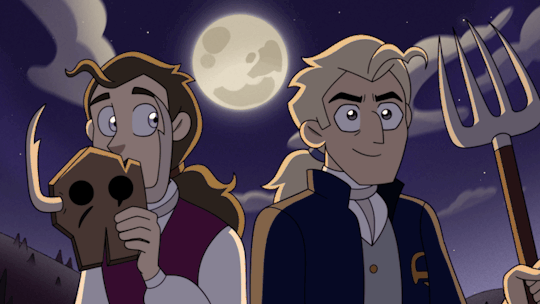
Chapter 2 - The Past
(Artwork by @a-magpie-in-gravesfield)
One of the signs that a character has been written with care, is that they can be broken down to the essentials and then put back together like pieces of a puzzle. If a viewer can analyze Belos as I’m doing right now, examining his life from start to finish, and understand exactly why he is the way he is...that can only mean he was masterfully crafted. This often traces back to their childhood and family, which is especially true for Emperor Belos. Or should I say, Philip Wittebane. Because a psychiatrist would have a field day with this lonely, hateful old man and all of his hangups, which all stem from his traumatic backstory. Philip’s goal is straightforward and horrifically simple, his motive is unwavering. He wants to eradicate all of the Witches in the Boiling Isles, and then return to the human realm where he likely assumes he’ll be hailed as a hero. (At least initially. That last part would change in Season 3, and I’ll talk about that down the road.) This is in spite of the centuries he has spent in The Demon Realm, interacting with Witches time and again. Nothing has widened his perspective. Nothing will change his mind. There are two reasons for this. The first is plain and simple racism. But the second reason…is Caleb.
We learn the truth about Philip in Thanks To Them, though the story was heavily foreshadowed in Hollow Mind. Growing up in the seventeenth century, he was raised by his older brother Caleb after they were orphaned. When they moved to Gravesfield, Caleb became a Witch Hunter in an effort to be accepted by the village, and trained Philip in the trade as well. At some point, Caleb encountered the Witch known as Evelyn, and the two of them left for The Demon Realm. Philip set off in pursuit, carrying a jagged knife. From here, we don’t know exactly what happened, and this is where the portraits from Hollow Mind can fill in the blanks. Because even in Season 3, likely due to executive meddling, the truth is still obscured and left ambiguous. However, eagle-eyed fans put the portraits together and deduced how this sorry tale ended. Philip journeyed through the Demon Realm until he found Caleb. By that point, he had already begun to consume Palismen, as Caleb is shown embracing Philip in his hidden, monstrous form. This act from Caleb is a symbol of acceptance, in total opposition to Philip’s mindset. He accepts his brother, even in an inhuman state. But Philip cannot return the favor. Dana Terrace has confirmed that Caleb and Evelyn fell in love, that Evelyn was pregnant. But Philip could not tolerate such a reality.
It is heavily implied that Philip murdered Caleb, though the details are vague. It’s possible that he was aiming for Evelyn, and Caleb shielded her. That would make a lot of sense, as by his own admission, Philip “tried to save” Caleb’s soul. However, one of the portraits shows Caleb likewise holding a knife, looking frightened and upset, as though Philip has challenged him to a duel. Philip was also stunned into silence at Luz’s accusation that “you did it to him first.” Specifically that Philip/Belos had stabbed him in the back. Whether Luz was talking about Hunter or Caleb, whether or not she knew the double meaning of her words, Belos was clearly thinking about Caleb, evidenced by hallucinating an image of him only hours later. (To see images of all the Hollow Mind portraits in detail, follow this link.)
It’s not clear what the circumstances were, and Belos is not exactly a reliable narrator. The murder of his brother had a profound impact on him that lasted through the centuries. But regardless of the details, Belos being responsible for Caleb’s death is spelled out about as directly as Disney would allow in For The Future, with a hallucination of Caleb that features that same jagged dagger floating over his head. The blade is stained with blood and is pointing at Caleb’s head. It’s an image that evokes thoughts of the Shakespeare play Macbeth - a tragedy that depicts a noble hero descending into darkness and murder. Quite appropriate for Belos, who unfailingly views himself as the good guy, as the savior of humanity, the Witchhunter General. He’ll do “anything” to save humanity from “evil.” To that end, Philip murdered his brother, and not just once. I said before that a psychiatrist would have a field day with this man, and truly, they could write an award winning paper on the psyche of Philip Wittebane,and the way he constantly recreates Caleb’s death by means of the Grimwalkers.
We know little about them, but Grimwalkers appear to be imperfect clones created from the remains of a corpse. Which means Belos preserved Caleb’s body and harvests his DNA for this project. Every time he builds a Grimwalker, Belos attempts to reset his relationship with Caleb back to a state that he prefers. He tries to rewrite history, rewrite his own memories of Caleb so that he needn’t face the fact that the big brother he idolized, actually evolved beyond his prejudice. But it never works. Each and every time, the Grimwalkers “choose to betray” Belos. Just as Caleb “betrayed” Philip by leaving with Evelyn. This pattern never changes, yet Belos won’t stop trying. Paradoxically, he also seems to give up on the Grimwalkers remarkably fast. We can see the exact moment Belos decides to kill Hunter, and it’s for no other reason than because Hunter has learned the truth and demanded an explanation. It’s not surprising that Belos would define this as a “betrayal” but it does mean we should take that version of events with a grain of salt.
Because Belos is a liar, through and through, and his perception of events is warped by his narcissistic tendencies and his seemingly indestructible bigotry. Rather than try to salvage his relationship with Hunter, Belos wrote him off as a lost cause, contaminated by the truth. How many Grimwalkers were killed for asking a question? For learning something that he didn’t want them to know? For talking out of turn? For failing to live up to the idealized vision of a ghost who they don’t even know about? Belos is an old man knee-deep in denial, and he intentionally perpetuates the cycle of abuse on innocent children for no other reason than because they have Caleb’s face. He wants someone to fulfill his fantasy of Caleb making the “right” choice and helping him wipe out the Witches. He wants to hear Caleb tell him that he was right to do what he did. But it will never happen.

(Artwork by @pespillo)
Chapter 3 - The Other

Unresolved familial issues aren't all there is to it, though. There are also his values. As we’ve talked about, there are two contributing factors at play. The unresolved issues with Caleb, but that wouldn’t be enough on it’s own to motivate a plan of genocide. Such a thing comes from raw, unfettered hatred of witchkind, from a kind of racism. A fear and intolerance for anyone perceived as "other" and the dehumanization of such people that comes with it. Which feeds into his brother-issues as well. Belos surely blames Evelyn for “corrupting” Caleb. Yet if we want to know where this prejudice began, we need look no further than his upbringing. The man hates Witches, partially because of Evelyn, but partially because he was a Witch Hunter. In Connecticut. During the 1600s. There’s a very simple answer if one does the math. Belos is a Christian man. Specifically, he’s a Puritan. If you know your history, you know the Puritans were a rigid, intolerant society that were so extremist in their faith that it bordered on resembling satire. This is the environment Philip Wittebane grew up in.
Of course, this is never directly spelled out in the dialogue, because doing so on a Disney Channel kid’s show is…never going to happen. But we know it’s true. In Dana’s initial concept, The Boiling Isles was actually supposed to be Hell. Belos is a God-fearing Puritan who believes anything “sinful” is evil and must be purged. Witches were seen as consorts of The Devil, they would be no exception. So there we have it. In the series finale, Dana actually sneaks a more overt reference into the script. After possessing The Titan’s corpse, Belos screams “Finally. I can cleanse this Perdition MYSELF!” The word “Perdition” is defined as “a state of eternal punishment and damnation into which a sinful and impenitent person passes after death.” Philip despises The Boiling Isles, and he always will. Because despite having lived there himself for centuries, it will always be a land of sin occupied by the Devil’s children. That’s all that matters.
This outlook is no accident. This is an essential cornerstone of Belos’ villainy and his character, but also of the themes being explored, and the greater story being told. I said before that acceptance is the message of The Owl House, and one of the greatest problems with religion is how intolerant it can often be of anything that does not “fall in line” with its perspective. Belos is a physical manifestation of everything that’s wrong with The Bible, or at least how it’s often interpreted in modern day. He is hateful, prejudiced, obsessed with his own vision for how the world ought to be, and completely incapable of entertaining the notion that maybe he’s wrong, that the world is bigger than his perception of it. He will not tolerate anyone or anything that contradicts his point of view.
Without getting too political or topical, there are many real life parallels to be drawn from the conflict of this show. People fighting for their rights and freedoms against oppression that is fueled and supported by religious communities. Belos proclaiming that he will “cleanse this perdition” is him announcing his (second) attempt to commit genocide on the Witches. In that line, we hear absolute rage toward the world he despises. The mask has completely fallen away, and in that moment, we see Belos for who he truly is. Perhaps the scariest part is how people like him are not uncommon in the world. What’s more, since it bears repeating - this was his second attempt to wipe out all life in the Boiling Isles! People who are evil enough to attempt genocide do not stop just because they didn’t succeed. They keep trying. People like Belos are desperate to erase the group they hate.
If that wasn’t enough, Belos is even more dangerous, conceptually, than some of his contemporaries. His faith and how he exploits the idea of faith, help him stand out against characters like Ozai from ATLA and Horde Prime from SPOP are cruel, sadistic, and mad with power, just like Belos. The difference is, those characters weren’t raised in a Puritan society. You see, despite his racism, despite his overinflated sense of self-importance…Belos does not have a God Complex. He sees himself as the hero of the story, but not as the Creator. Because of how he was raised, he would never see himself as a God. In his mind, there’s another who occupies that role. When Belos rules the Boiling Isles, notice how the mythos he creates for himself places him firmly as the second in command. He establishes himself as a Prophet for The Titan. He becomes the “Jesus Christ” of the story. Even when Belos is lying through his teeth and propping himself up, his comfort zone seems to be telling himself and the world that he is not self-interested, and is merely representing the will of a higher power.
Herein lies the danger of the lies that Belos is selling. The Coven system is terrifying because it doesn’t immediately seem so bad. Ever since Harry Potter, having magical “groups” for your characters to be sorted into has been the trend. Within the Boiling Isles, the Covens are popular and normalized. It is “cool” to graduate and join your Coven. Never mind that doing otherwise is literally illegal. It is not hard to envision an equivalent to the Coven System being established in the real world as a means to control people disguised as the newest meme, convenience, or fad. The power of a cult can be staggering. Again, I won’t point fingers, but I suspect we all have something particular in mind.
But this works extremely well with The Owl House, with its messaging, and with its protagonist.
This frightening, uncompromising bigotry from our villain, as well as the utter devotion to such values, is part of what makes Luz such an effective protagonist for this tale, and why she makes such a perfect foil to Belos. She is the type of person who Belos should realistically loathe with all his heart. She’s a bisexual neurodivergent woman of color. She is everything that Puritan society would recoil from. Yet that’s mostly saved for symbolism, (again, the religious aspects of this show are kept to subtext) as Belos initially appears to accept Luz and attempt to forge solidarity between the two of them as fellow humans. Whether or not he was being truthful, who knows. You never know with Belos. Perhaps he was simply excited to see another human again after so many years, and therefore willing to overlook her “flaws.” But he did indicate that he would show mercy toward another human as, for the purposes of the show, it’s Witches that he hates. This presents Luz with the opportunity to reject his offer and continue to be a fantastic ally to The Boiling Isles, thereby setting a great example for viewers. Yet, Luz also checks herself. She fears becoming like Belos, even though she needn’t, and she feels tremendous guilt for having inadvertently helped him even though she didn’t know any better. We could all learn from Luz’s attitude.
She and Belos are compared and contrasted quite a bit throughout this show, despite how utterly different they are. The Titan is shown to accept Luz immediately, as opposed to Philip, who suspects that The Titan was deliberately impeding his effort to learn magic. Which creates yet another example of him coping with failure by rewriting history, when he invents the story of being The Titan’s prophet. Through Luz, the duality of Belos is explored and later subverted. We meet Philip Wittebane through his diary, and he seems like a decent man at first. Then we see the truth, first that Philip is truthfully a wicked, scheming murderer…and then we see his real identity. This is, itself, a twist on typical tropes. In any other show, Luz might have clung to the image of Philip, insisting that it wasn’t all an act, that he must be in there somewhere. (This idea is even mocked during his death scene, and we’ll cover that too.) But once again, Philip is not some long-forgotten version of Belos. He changed his name for no other reason than because he was getting a reputation and needed to start over. He prefers the name Philip, for he still sees himself as a human among witches, a hero among monsters. As opposed to Luz, who embraces both realms. She is a “child of the human realm, student of the demon realm.” Even as a teenager, Luz is already wiser than a man who has lived for centuries.
Chapter 4 - The End
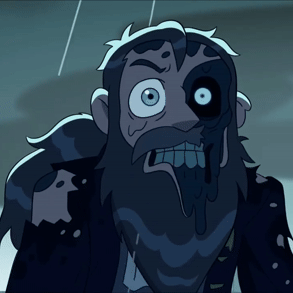
The death of Philip Wittebane is appropriately pathetic, and once again plays on the expectation of more common tropes. When he is ripped from The Titan, he materializes as his younger self. He thanks Luz for saving him from the curse that ailed him, causing him to act as evil as he did. Yet it is immediately obvious, to the audience and to Luz, that this is just an act. He compares himself to Eda, but Eda’s curse never affected her personality, and it didn’t take her four hundred years to master it. No, Luz and the others have been fooled too many times, they’re not getting fooled this time. Lesser shows might have had this be genuine. Might have let Philip return as a friend or even pass on, absolving him of all responsibility by having him be “under a spell” for the duration of his crimes. But The Owl House doesn’t do this.
Instead, we get one last half-measure, one final attempt from Belos to manipulate the characters and save himself. He’s always been a charlatan, so this is to be expected. What sells this idea is the expression on Luz’s face. We can see just how done she is with Belos and his lies, and in that moment, clouds gather, and boiling rain falls. Luz is unaffected, and this appears to be no accident - but Emperor Belos slowly dissolves, eventually giving up on the facade. The rain figuratively and literally strips away his disguise, revealing him for the monster that he is. While it’s not clear if this is the will of The Titan, or if it’s actually Luz’s doing, it doesn’t particularly matter. Either way, she doesn’t lift a finger to help him. Either way, the irony of this devout Christian succumbing to what seems to be a literal act of God is absolutely priceless.
In his final moments, Belos demonstrates his fundamental flaw, one last time. “You’ll be just as bad…just as conniving…just as evil…and just as unforgivable as THOSE WITCHES!” For a brief moment, the dialogue sets you up one more time, to think that he’s falling back on expected tropes. The audience expects him to say “you’ll be just as bad as I was.” Or something to that effect. That is the implied ending of that thought, to anyone with a shred of self-awareness. But Belos doesn’t have that. As The Titan said, he cares for nothing but being the hero in his own version of reality. To the very end, he blames the Witche for everything. To the very end, he is incapable of seeing the error of his ways or taking responsibility for his actions. His racism shines through his last words, one final plea for Luz, and the world, to see things his way. “We’re human. We’re better than this!” As if Belos is better than anyone. As if Luz hasn’t made it abundantly clear where she stands. As if Belos didn’t surrender what made him “human” for the sake of fighting the Witches. In his last breath, Philip Wittebane clings ferociously to a world that no longer exists. He is a fossil, a remnant of the bygone Puritan era, extinguished in the light of a brighter, more tolerant future. Belos dies with the past, as well he should.
At the end of the day, the biggest and most consistent problem with Belos is his refusal to change. He cannot or will not learn any kind of lesson from his experiences. Nothing will challenge his worldview. He is a hypocrite who decries witchkind despite having used more magic than most characters to sustain himself. Not because he is afraid of death, there’s no evidence that he is. (Let’s be honest, the man probably expects admission into Heaven.) No, he simply wishes to “live long enough to see this through.” In other words, he can’t die until he’s finished his plans for genocide. His bigotry inevitably cannibalizes itself to survive, as is often the case in real life. During Thanks To Them, he spent months recovering from a near death experience in the human realm - he saw for himself how drastically things had changed. He saw the twenty-first century, and this did not deter him one bit. How is that possible? Unfortunately, we don’t see much of his reaction to the modern human realm, but when we next see him, he is attempting to return to the Demon Realm. It’s quite possible that he has no desire to exist in the changed, tolerant world Luz comes from, so he has nothing left to live for but slaughtering The Isles. Because no matter how fancy one dresses up their hatred, at the end of the day hatred is singular. Hatred is alone.
Well this was a whole freaking thesis. Still, I had fun writing it, and I hope you guys had fun reading it. But for now, that's all from me. Byeeee!
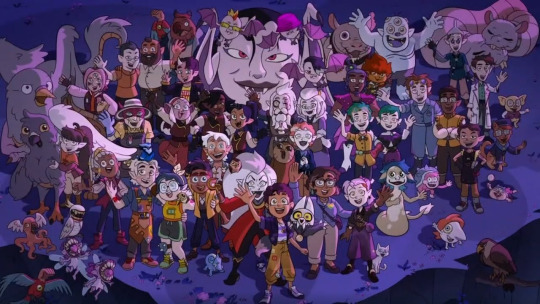
#The Owl House#Emperor Belos#TOH Analysis#TOH Spoilers#The Owl House S3#Philip Wittebane#Luz Noceda#Caleb Wittebane#Hunter TOH#TOH Belos#The Owl House Spoilers#The Golden Guard#TOH Evelyn#Thanks To Them#Hollow Mind#Watching and Dreaming#For The Future#TOH Emperor Belos#Hunter Noceda#Luz The Human#The Owl House S2
34 notes
·
View notes
Text
I KNOW ALL MY POSTS KEEP SWITCHING BETWEEN FANDOMS BUT I AM VERY INDECISIVE and my brain has a million tabs open and it’s like multiple different Amtrak trains crashing into each other because there’s only one track
Anyway
I have a He-Man/She-Ra OC that I’ve been wanting to post here for a while now but never got around to doing it,, but I am now ehe
Making a tag for her to keep track of all of her stuff because my memory be so bad 😔
The first variation of her that I’m going to post is her SPOP design. Even though she needs a redesign, I’m keeping this one for now
I’ll post her information for MOTU later once I get all of that information sorted out and everything
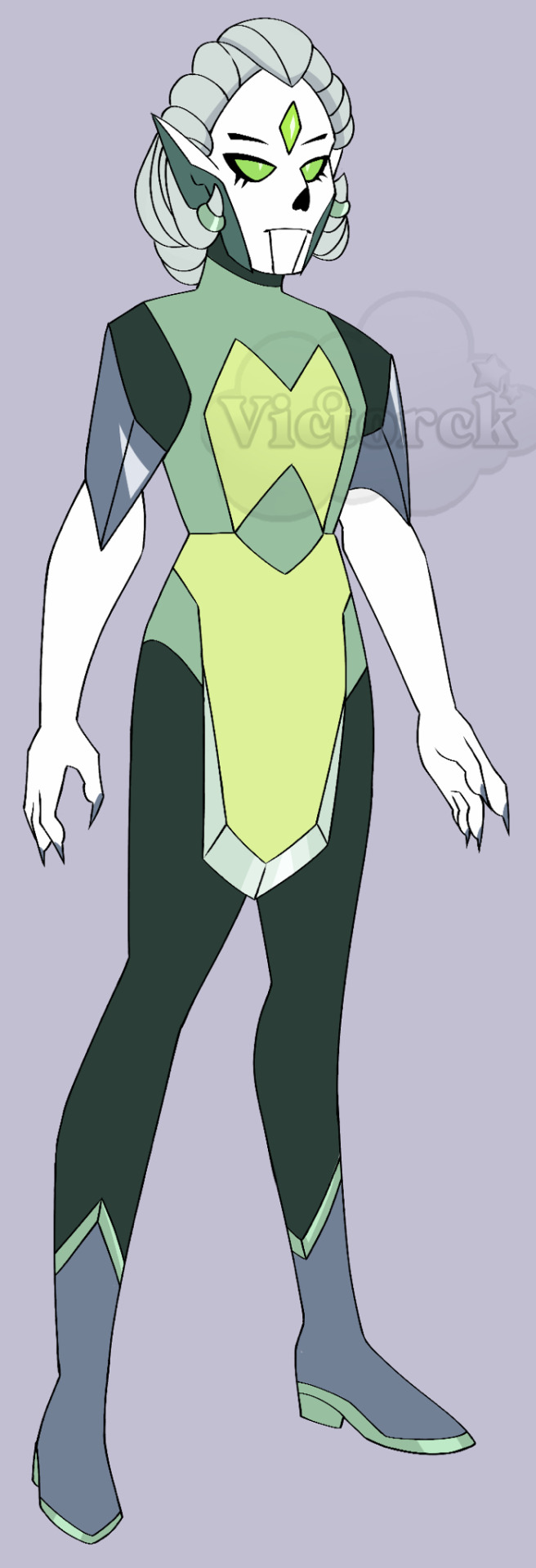
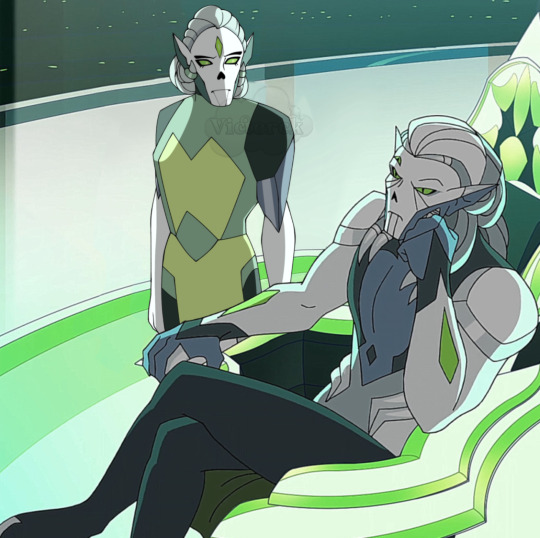
Basically… her backstory changes for each franchise, but majority of the details stay the same.
Her SPOP backstory is obviously different, considering that the Netflix reboot is in no way associated with MOTU, which is what she was originally created for. So her backstory for SPOP is still a huge work in progress.
In the (Netflix)SPOP universe, her name is Zenith.
She was was created by Horde Prime to help him in his quest to rule various planets, galaxies, and universes. She was given her own name by the galactic dictator, and allowed freedom that no other clone has ever been given.
Primarily due to the fact that Zenith was meant to be the next vessel for Horde Prime, and because she was a successful prototype of a hybrid clone that he practically created for fun.
While Zenith refers to him as Father, Horde Prime refers to her as daughter. Even though they act more like salty siblings than anything.
With the combination of technology and magic, she is able to change forms at will. Zenith is able to disguise herself to gain the trust of the inhabitants of different planets, before allowing Horde Prime to finish them off.
When her ascension to being Prime’s next vessel was supposed to occur, nobody from Prime’s fleet actually knows. Not even Zenith herself. Horde Prime kept all information regarding the events to himself, and away from the Hivemind.
She ended up staying on Etheria to learn more about its history, culture, and to try to unlearn a lot of the things that she was subjected to under Horde Prime’s teachings.
A lot of this information is subjected to change since her MOTU counterpart is more developed than anything.. but yeah.
13 notes
·
View notes
Text
One of my favourite things about shera is that the show always makes me empathetic and genuinely like some of the main villains. take hordak, he’s committed war crimes but I still feel bad for him. all the villains (except hord prime) have compelling backstorys, their still villains, still people who’ve done terrible things. yet their complex and are really quite sad. shera has an amazing ability to show that almost no one is ‘born evil’ events have to happen to push that person into a desperate enough position to be like this. They exactly never say that they should be forgiven for their actions simply why their doing them. while many of those villains got somewhat redemption arcs but I thought it was done in an amazing way.
Specifically characters like catra, shadowweaver and Hordak. I could rant about thier redemption arcs for a long while but I would like to do that separately, so I’m gonna leave this off here. Hordak is genuinely one of my favourite characters so he’ll probably go first as i may be a little biased. Hope you enjoy!



#she ra and the princesses of power#she ra#hordak#character arcs#Analysis#seriously props to the writers#catra#shadow weaver
43 notes
·
View notes
Note
This "very bad person should never get backstory or depth" insistence sounds like cope (if they had the time to show the backstory but ended the same, I'm sure people wouldn't be saying they shouldn't have), is very concerning and strange, and I hope future storytellers don't take this as inspiration that the world needs more villain stories that end unsatisfying purposely. It's so obvious that it's what it is because they had to trim fat, or they wouldn't have given Belos a backstory at all.
Part of it is coping, the other half of the fandom likes Belos' ending because he "deserved" it and some even think that a sympathetic backstory would mean that the writers are trying to "redeem" him in some way. When no, that's not how any of that works.
Also, I'm tired of fans insisting it's bold or revolutionary for a kid's show to not redeem their main villain or give them a tragic backstory. Most Big Bads are just villains and no attempt is made to make them sympathetic (Bill Cypher, Ozai, Horde Prime, Dr. Emilia from Kipo and the Age of Wonderbeasts, etc). You will have abused lackeys or even secondary antagonists redeemed but then there's always that one final boss villain who is just there to be defeated and is actually the cause of all the suffering in the plot.
Belos could have been a character who was the Main Villain and had a sympathetic backstory that wasn't trite and he would have died as the Tragic Villain he was. But the writers dropped all that and decided not to answer any questions regarding him despite building it up for two seasons.
Future writers: don't focus on trends or trying to "subvert" what's popular. Just tell a good, well-structured story. Trust your audience. Remember that set-up and pay off are critical. And that the ending can make or break your story.
95 notes
·
View notes
Text
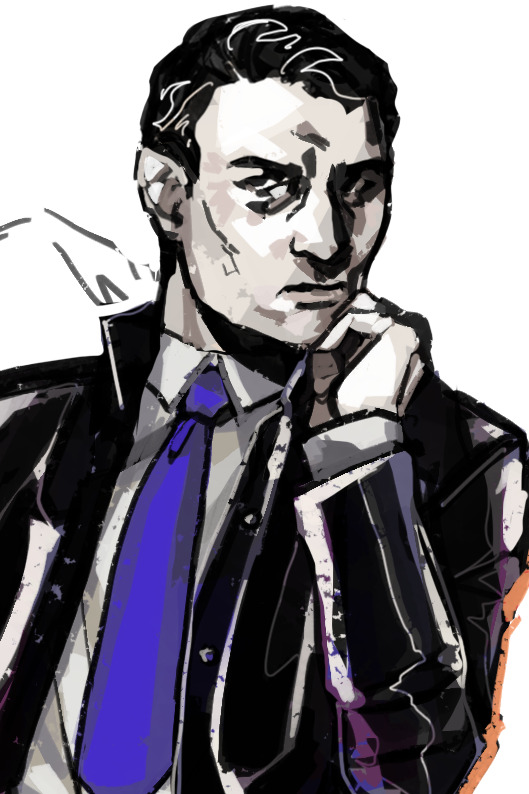
Art by the wonderful @/bugcouncil!
I realized that I'd been on-and-off Percy posting without having actually laid the groundwork out for everyone else to see, lmao. Let's do something about that (salute emoji) Blood and Silicon players pwetty pwease don't read this: I may use Percy as a back-up character and wouldn't want you to be spoiled :)
His (current) character sheet is a mash-up between V5's character creation rules and some of V20's Merits/Flaws. I'd keep some of them for subtext were he to need a V5-Only character sheet. Just a heads up :)
BASIC INFORMATION:
NAME: Percival. Percy to allies. Sir Percival, Caine's Anointed in formal address.
PREDATOR TYPE: Alleycat.
CLAN: Ventrue [Antitribu]
GENERATION: 12th.
SECT AFFILIATION: The Sabbat. [Anarch Movement too, if Pauline dies or something.]
D.O.B: May 13th, 1900.
D.O.D: February 20th, 1942.
APPARENT AGE: Late 30s, Early 40s. [42]
HEIGHT: 5'6'' | 167 centimeters.
BACKSTORY
Boxer in life, a Templar in death; Percy's feverish devotion to the Hand's assortment of causes is, in no small part, exacerbated by the fact that he had the displeasure of being on the frontlines of the Week of Nightmares back in the Summer of '99. Tasked with aiding the Sabbat's (numerous) failed attempts at claiming domain within Asia, his (notably Ravnos) Priscus was called on for aid and what is a loyal knight to do but follow in her stead? This, unfortunately enough, put them on the frontlines for [Ravnos'] awakening a few miles over in India even if the pack never had the misfortune of laying eyes on the Ancient themselves. He and his pack spent the better part of three days attempting to watch over the torpid form of their packmate and leader within the winding, vacuous corridors of a hotel. They'd staked her with the intention of pacifying her until whatever illness besetting her took its leave, but there was only so much a handful of Cainites could feasibly do. In the end they were ultimately unsuccessful in keeping the veritable horde of her cousins away, on the verge of final death amidst all of the gore and viscera, Percy had a reaffirmation of faith in a wicked way. He's devoted the entirety of his being to the Sabbat and its overarching goals; [Ravnos]' blood plugging any holes the Sabbat's propaganda machine may've missed. He's not incompetent enough to go around shouting his allegiances from the rooftops, but his disdain for the Ivory Tower is as self-evident as the gray hairs that adorn his head. Timeline One [where I'm currently using him :)] - Percy's Priscus meets Final Death, unconsciously. Percy comes out of it in one piece and still serves the Sword of Caine dutifully. Timeline Two [Blood and Silicon, should it be necessary]: the Priscus was never staked and Percy himself was beaten into Torpor before being brought back to the United States for recovery once the fighting had ceased. He would've woken up, his Faith reaffirmed tenfold, to find that the Sect itself had all but collapsed during his nap. Their old haunts having been taken over by the Anarch Movement or, Caine forbid, the Camarilla and none of his sect mates to call upon for an update or guidance of any kind. A man out of time, wandering aimlessly, and forced to contend with the knowledge that there really are ancient evils in dire need of putting down, but with no feasible recourse against them. Languishing in the company of blind Cainites whose knee-jerk reaction would be to take his head if they knew what he truly was, a shell of his former self
NOTABLE ATTRIBUTES:
Strength (••••) You are a prime physical specimen, likely with very visible musculature.
Dexterity (•••) Your agility is impressive, and your coordination is as good as any trained amateur.
Stamina (•••) Several days of hard hiking with a backpack is no problem for you.
Wits (•••) You can analyze a situation and quickly work out the best escape route.
NOTABLE SKILLS:
Firearms (•••) You've been in the shit ("Seen the elephant" if you're older than a century) and come out the other side.
Melee (•••) Your skill with a melee weapon is known throughout the domain.
Awareness (•••) You can see through most disguises and sense concealed dangers or hidden clues.
Occult [S: Noddism] (••) [in regards to Noddism, specifically] You have firsthand experience of something inexplicable, even by Kindred standards.
MERITS/ADVANTAGES/FLAWS (a mix of v5/v20. will mark appropriately):
I Was There (•••) [V5] [Merit] [Loresheet: THE WEEK OF NIGHTMARES] You didn't just hear about it, you were on the front line. Your reputation as a survivor and on-the-spot veteran of the Week of Nightmares grants you Status among Kindred historians, occultists, Ravnos, and Gehenna cultists alike.
Blessed By St. Gustav [V20] [Merit] Many Ventrue antitribu replace their traditional affinity for Presence with an aptitude for Auspex by means of the ignoblis ritae known as the Prayer to St. Gustav. For your piety and devotion to the Sabbat cause, you have been especially blessed and have an affinity for both Disciplines.
Resources (••) [V5] [Background] Middle Class: nice apartment or small house, several cars, high-end equipment.
Nightmares [V20] [Flaw] You experience horrendous nightmares every time you sleep, and memories of them ahunt you during your waking hours. [Ravnos] raging, [their] flesh rending.
Tic/Twitch [V20] [Flaw] You have some sort of repetitive motion that you make in times of stress, and it's a dead giveaway as to your identity. He tends to tap one of his feet, normally his left, impatiently.
Eerie Presence [V20] [Flaw] Mortals have an unconscious awareness of your undead nature, which makes them anxious and ill at ease in your presence. He's too still & doesn't blink anywhere near as often as he should.
TIMELINE OF EVENTS:
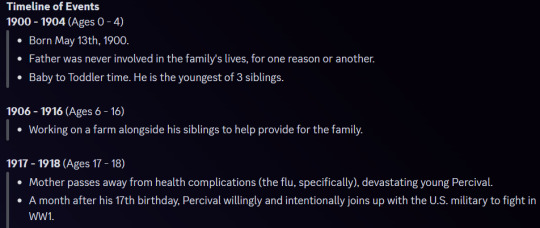
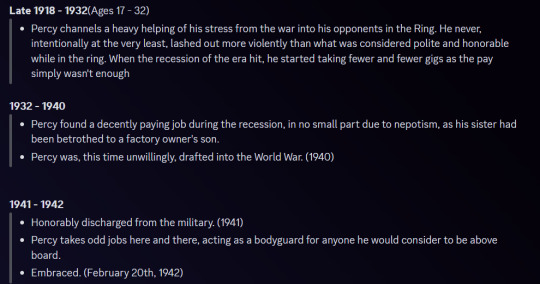
July 1999: Ravnos Moment.
MISC.:
He'll refer to Cainites by their proper form of address, a Bishop as "[your] Excellency" for example, and would rather be damned a second time than do otherwise. He's exercising his freedom by choosing to adhere to the formalities.
His Sire supported the Lasombra War Effort during the Second Sabbat Civil War, making the mass defection smart that much more. He was Embraced 11 years too late to have actually partaken in it himself but he has Opinions.
24 notes
·
View notes
Text
melog was really wasted potential. they could have been more relevant to the plot, especially considering how they were from a planet that the first ones drained too much magic from and that horde prime later tried to destroy. melog was also apparently the last of its kind. this is a LOT of backstory that the creators did nothing with.
melog later just turned into a plot device for whenever the characters wanted to be sneaky, and also became an extension to catra's feelings.. just because.
there's really no reason why melog should be representative of catra's emotions except that the writers were too lazy to show catra actually attempting to change. they could instead just show melog being nice while catra is being an asshole, and say “look, guys! catra actually likes adora, she's just too tsundere to show it”.
and the thing is, melog being an extension of catra's emotions could have been used smartly. they could have represented catra's guilt and her attempts to actually change. her inner conflict and learning to not always put herself first. but they just.. don't do that.
if anything, melog should have been more connected to adora. because they're both made of magic and also because both of them were hurt by the first ones. they could have bonded over that but no, melog imprints onto catra because They're Both Cats and because catra is the main character apparently.
there was really no need to give melog such a traumatic backstory and a connection to both horde prime and the first ones, only to later never address it at all and turn them into the cute animal sidekick instead.
52 notes
·
View notes
Text
i feel like hordak is... kinda useless.
i mean, i think he's an interesting character. he's supposed to be the main villain of spop, right? but he has no relevance in adora's arc. they have no relationship at all (even if s5 suddenly decides "oh hey hordak has fond memories of baby adora" when that was NEVER established before).
in the og series, hordak was adora's father figure. i rlly would like to know why the reboot discarded that. for one, it wouldn't make adora and catra sisters, if the latter was still raised by shadow weaver. second, at least hordak would have a more important role. imagine how intriguing it would be for adora to go against her father.
but yeah, hordak was pretty much replaced with catra. she's the actual antagonist of spop. while i think catra is a great villain (minus her "redemption" ofc), i also feel bad for hordak. i like his relationship with entrapta, don't get me wrong, and i also like his backstory, but hordak is just... there. he doesn't rlly do anything. he has good moments in s5, it's just that hordak doesn't have more meaningful relationships other than entrapta (and i guess that imp baby? which was sorta adopted by the horde trio?). i don't count horde prime bc it didn't have enough screentime.
and i don't have to mention again how shallow horde prime is, right.
36 notes
·
View notes
Text
Headcanons about Shadow Weaver for the AU and Her Backstory
• Shadow Weaver was created as a failed clone for Horde Prime
•Horde Prime’s clones start off as small children
•When cut off too long from the Horde Prime hive mind, his clones get sick, so Shadow Weaver has a sickness
•Shadow Weaver was even nicer when she was younger, but some accident happened that turned her to become power hungry
That’s all for now. I’ll get to work on the first bit of her backstory and the AU as soon as I can. First, though, I need your opinion
#artists on tumblr#she ra shadow weaver#she ra#spop#gravity falls#gravity falls au#gravity falls/she ra
4 notes
·
View notes